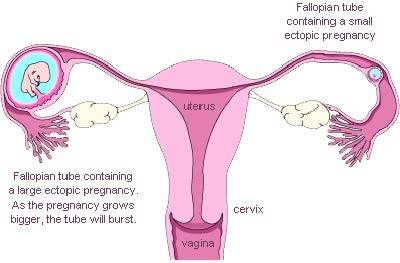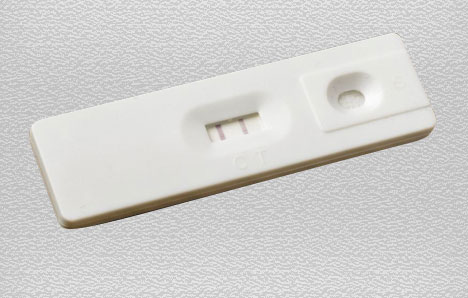Ectopic Pregnancy
 An ectopic pregnancy occurs when a fetus begins to form outside of the womb. It’s a pregnancy that happens anywhere except inside the uterus where it’s supposed to happen. An ectopic pregnancy is life-threatening for the mother and cannot support the full-term growth of the baby.
An ectopic pregnancy occurs when a fetus begins to form outside of the womb. It’s a pregnancy that happens anywhere except inside the uterus where it’s supposed to happen. An ectopic pregnancy is life-threatening for the mother and cannot support the full-term growth of the baby.
Commonly, a fertilized egg travels to the womb, or uterus, through the fallopian tube. Sometimes, the egg becomes blocked for some reason and cannot continue along the path. Left untreated, the tissue that begins to grow from the egg can cause damage to surrounding organs, leaving you infertile. Severe blood loss can lead to death. Early intervention is vital to prevent further damage. Any signs or symptoms should always be evaluated with a thorough consultation and examination by a physician at our NYC gynecology clinic for an accurate diagnosis and treatment plan as it may be a symptom or sign of a serious illness or condition.
Ectopic pregnancies are any pregnancy that occurs outside of the uterus
Manhattan Gynecologists of Manhattan Women’s Health & Wellness offer a comprehensive Obstetrics & Gynecology care in NYC for women of all ages. At our obgyn clinic of we provide a full range of gynecology services, from annual check-ups and routine pap smears to Ectopic Pregnancy Treatment and gyn procedures, surgeries performed in our office or in the hospital. Our state of the art gynecology NYC facility equipped with a latest obgyn equipment.
Ectopic Pregnancy Statistics
Ectopic pregnancies occur in about one in 50 pregnancies, representing about two percent of all pregnancies nationwide, according to the American Pregnancy Association. Of all pregnancies that lead to death, nearly nine percent are caused by ectopic pregnancies.
An ectopic pregnancy doesn’t have to mean that future endeavors to conceive won’t succeed. More than a third of women will have a normal. healthy pregnancy after having an ectopic. But if you’ve had an ectopic pregnancy, your risk of having another one increases nine times over women who’ve never had one.
Risks play into the ectopic pregnancy statistics as well because having an appendectomy doubles the chances that you’ll have an ectopic pregnancy. You also are at a greater risk if you’re over the age of 35 or under the age of 20.
Placement Varies
Most of the time, an ectopic pregnancy occurs in the fallopian tubes, which is why an ectopic pregnancy often is referred to as a tubal pregnancy. Though less common, an ectopic pregnancy also can occur in the cervix, which is the neck of the uterus, ovaries, or abdominal cavity.
A heterotopic pregnancy happens when you have a normal pregnancy and an ectopic pregnancy at the same time. Very uncommon in natural forms of conception, heterotopic pregnancies usually occur after some level of assisted fertilization. Heterotopic pregnancy sometimes is also referred to as combined ectopic pregnancy, coincident pregnancy or multiple-sited pregnancy.
Causes Range Widely
If caught early, ectopic pregnancies can be treated with a medication
Many ectopic pregnancies occur because the fallopian tubes are damaged or misshapen somehow, causing the egg to get stuck. Other conditions that can contribute to such an ill-fated pregnancy include:
- Having a previous tubal pregnancy
- Endometriosis
- Scarring after any abdominal surgery
- Birth defects that left your fallopian tubes damaged
- Pregnancy with IUD in place
- Having had a tubal ligation
- Having multiple sexual partners
- Fertility treatments
- Pelvic infections
- Smoking
Know the Symptoms
Ectopic pregnancy pain usually begins with common symptoms you get from a regular pregnancy such as nausea in the mornings and tenderness in your breasts. All signs and symptoms should always be evaluated with a thorough consultation and examination by a physician for an accurate diagnosis and treatment plan as it may be a symptom or sign of a serious illness or condition. You’ll stop having your period and may experience one or more of the following symptoms, indicating problems:
- Vaginal bleeding
- Pelvic pain
When fallopian tube pain increases, it may indicate that a rupture could have taken place. Signs that you need immediate emergency medical attention include:
- Nausea and vomiting accompanied by pain
- Pain in your shoulders
- Feeling faint or actually fainting
- Intense rectal pressure
- Sharp, severe and sudden pressure and pain in your lower belly area
- Dizziness
The consequences of a rupture are life threatening because it can lead to excessive internal bleeding
Diagnosis Discovered

The first step in diagnosing an ectopic pregnancy is through a pelvic exam where your gynecologist looks for inappropriate pain and tenderness. Sometimes, the tubal pregnancy can be felt in the fallopian tubes as it grows. Sometimes, an ultrasound can confirm the presence of a growing embryo outside the uterus.
During testing, your hormone levels are checked for abnormalities, since your human chorionic gonadtropin (hCG/pregnancy hormone) levels usually are lower if you have an ectopic pregnancy.
An ultrasound is key in conjunction with pregnancy hormone levels in order to identify and distinguish a normal pregnancy vs an ectopic.
Early Treatment
Early treatment is best for your overall health and for recovering as much of your reproductive organs as possible and early diagnosis and treatment by your physician is crucial. Methotrexate is the most common medication used to treat an ectopic pregnancy. It’s vital that Midtown gynecologist evaluates you early on in pregnancy to identify an ectopic while it still can be treated with medications.
Another method to treat ectopic pregnancy that’s caught early is laparoscopic surgery. It begins with a tiny incision in your abdomen near your navel. Your gynecologist then relies on a thin tube equipped with a camera to view the entire tube and uterus. If found, the ectopic tissue can safely be removed through the incision. Your fallopian tube, if damaged, also can be removed at this time.
Emergency Procedures
If you experience heavy bleeding, you may have to undergo a laparotomy, which involves a larger incision through which the surgeon can remove the ectopic tissue and any damaged fallopian tubes. Heavy bleeding can lead to shock if not treated immediately with:
- Raised legs
- Fluids
- Keeping you warm
- Oxygen
- Blood transfusions
- Surgery
Recovery time following an emergency laparotomy can last as long several weeks. If your tubes and uterus weren’t removed during the surgery, you may be able to conceive again successfully. To increase your chances of a successful pregnancy next time:
- Practice safe, monogamous sex
- Stop smoking
- Get tested early for possible STDs that could damage your fallopian tubes
- Reduce risk of pelvic inflammatory disease by using a condom
- See your OBGYN early when you suspect that you are pregnant
Keep regular appointments to check your and your baby’s progress throughout your pregnancy
Important Reminder: This information is only intended to provide gynecology guidance, not a definitive medical advice. Please consult obgyn NYC doctor about your specific condition. Only a trained, experienced gynecologist or certified gynecology specialist can determine an accurate diagnosis and proper treatment.
Have questions about Ectopic Pregnancy? Schedule an appointment with the top rated OBGYN in NYC, Dr. Fernando Mariz, please contact our office.
Updated on Jun 25, 2020 by Dr. Fernando Mariz (Gynecologist), Manhattan Women’s Health and Wellness
Best-in-class
New York Gynecology Clinic
Manhattan Specialty Care in the Press

Call now to make an appointment with our highly rated Manhattan Gynecology doctors regarding your health. We look forward to seeing you!
book online now
(212) 378-9987
New York City Locations:
Manhattan Women's Health & Wellness (Upper East Side)
983 Park Ave, Ste 1D17
New York, NY 10028
(212) 389-1904
Manhattan Women's Health & Wellness (Midtown)
51 East 25th St, Ste 451
New York, NY 10010
(212) 677-7654
Manhattan Women's Health & Wellness (Union Square)
55 W 17th St, Ste 104
New York, NY 10011
(212) 378-9985